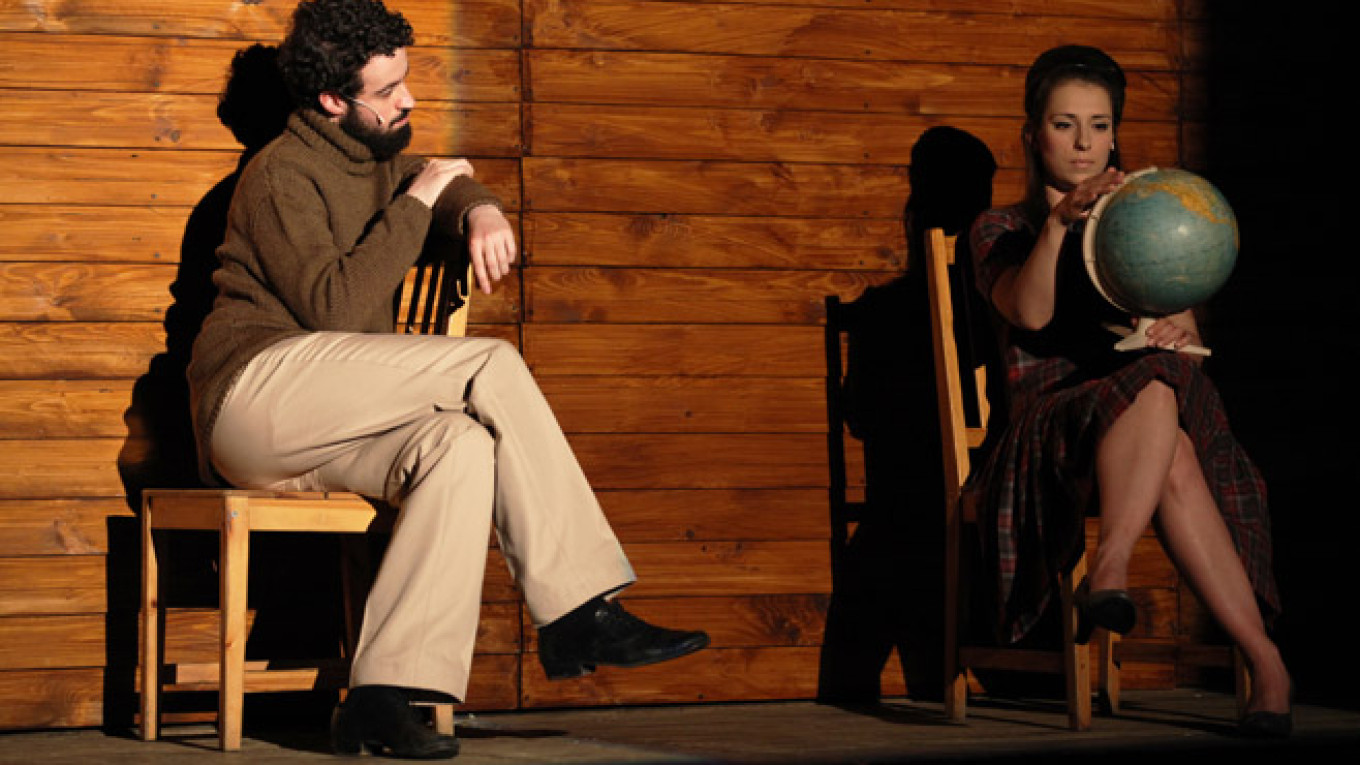In "1968. Novy Mir" at the Taganka Theater, Dmitry Volkostrelov shrewdly found a way to combine aesthetics, artistic methods and themes that are capable of unifying that distant era with the world we inhabit.
Someone may think he did not do much, just put five actors on chairs and let them loose. But Volkostrelov has emerged as a master of working near theatrical miracles while appearing to do little at all.
The title "1968. Novy Mir" refers specifically to the famous literary journal, which so deeply influenced Soviet culture in the 1960s. But it is obvious that the name of the journal, translated as "New World" in English, is also important to Volkostrelov and his team. This is a show made about a society that stood on the verge of change, of entering into a new era — before failing to do just that. The show has been made at a time when one might say the same thing about Russian culture and society — are we on the cusp of moving forward, or are we poised to fall back into the past?
The text of the performance, as might be done in any proper verbatim production these days, is drawn from various articles, essays, novels and poetry published in Novy Mir in 1968 — from the transcripts of the court case against those who protested against the Soviet intervention in Czechoslovakia, and from films and songs of the time.
The actors are dressed and coiffed in typical 1960s fashion, featuring the bearded intellectual male and the bouffant-haired female in a checkered, pleated skirt. They play chess, they do their make-up, they play the guitar or prepare food — all in a way that screams "1960s!"
Volkostrelov gives us our fill of the era right up front, leaving the actors silently to engage in petty tasks for what seems an eternity — the whisk whipping dough, the perfect eyeliner being applied, the guitarist struggling to hit the perfect chord. By the time laughter and muted expressions of discomfort ring out among spectators, we have been immersed deeply in a world that is extremely familiar, but long gone.
A director with a refined sense of humor, Volkostrelov even calls this first segment "Part One, in which nothing happens." Other segment titles, randomly numbered, include "Part Nine, in which people talk about love"; "Part Eight, in which there is no place for theater"; and "Part 68, in which they do industrial gymnastics."
Don't worry, there aren't 68 parts to this performance.
Each actor loosely takes on the persona of the authors of various texts. Topics include the trial of the dissident Vladimir Bukovsky; the Prague Spring; what a girl must possess to be attractive (stockings, shoes, etc.); and what makes Western workers inferior to Soviet workers (western workers have money, but no say in factory affairs).
A discussion of Vietnam, China and a possible third world war is accompanied by text scrolling on the wall behind the actors: "Now you will hear a song by the Doors, 'Hello, I Love You.'" In fact we don't hear the Doors, or the Rolling Stones' "Sympathy for the Devil" or the Beatles' "Back in the U.S.S.R."? — but we do see the words of these songs scroll silently down the wall as a strange and provocative soundtrack while the actors continue their foray into monologues and dialogues revealing dangerous days in 1968, and echoing days that we are living at present.
Later in the relatively brief performance — it runs for less than an hour and a half — a visual cacophony of words is splattered on the wall, with the texts of speeches running up against one another, overlapping and canceling each other out. It is a simple, but clever way or reminding us that there has never been, and never will be, a shortage of words and ideas. The problem is recognizing the ones that actually provide meaning.
"1968. Novy Mir" is still another beautifully conceived and precisely executed project of the so-called Jubilee Year Group of young artists, whose job was to employ art to celebrate the 50th anniversary of the great Taganka Theater. It has been an adventurous, challenging, probing way to mark the big birthday. It has been an unqualified success.
"1968. Novy Mir" plays Sun. and June 20 at 7 p.m. at the Taganka Theater, located at 76/21 Zemlyanoi Val. Metro Taganskaya. Tel. 8-495-915-1217. taganka.theatre.ru. Running time: 1 hour, 20 minutes.
Contact the author at jfreedman@imedia.ru
A Message from The Moscow Times:
Dear readers,
We are facing unprecedented challenges. Russia's Prosecutor General's Office has designated The Moscow Times as an "undesirable" organization, criminalizing our work and putting our staff at risk of prosecution. This follows our earlier unjust labeling as a "foreign agent."
These actions are direct attempts to silence independent journalism in Russia. The authorities claim our work "discredits the decisions of the Russian leadership." We see things differently: we strive to provide accurate, unbiased reporting on Russia.
We, the journalists of The Moscow Times, refuse to be silenced. But to continue our work, we need your help.
Your support, no matter how small, makes a world of difference. If you can, please support us monthly starting from just $2. It's quick to set up, and every contribution makes a significant impact.
By supporting The Moscow Times, you're defending open, independent journalism in the face of repression. Thank you for standing with us.
Remind me later.


